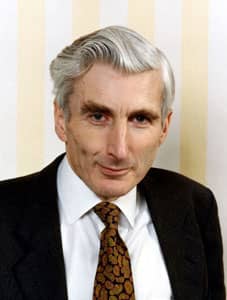 The Templeton Foundation has awarded its annual £1 million prize to Martin Rees, retired President of the Royal Society in London. I had the pleasure of meeting Lord Rees when he presented the Royal Society's science book prize (for which the UK edition of my book, The Genesis of Science: How the Christian Middle Ages Launched the Scientific Revolution, was shortlisted). Rees is an atheist with a fond cultural attachment to the Church of England. But although he isn't religious himself, he sees no conflict between Christianity and science. His best-known book, Just Six Numbers, is a frank admission that the universe appears to be finely tuned for life, something theists see as evidence that it is God's creation. New Atheists like PZ Myers and Jerry Coyne are furious that Rees accepted Templeton's lucre. Richard Dawkins has called Rees a "quisling," which is a reference to Nazi collaboration.
The Templeton Foundation has awarded its annual £1 million prize to Martin Rees, retired President of the Royal Society in London. I had the pleasure of meeting Lord Rees when he presented the Royal Society's science book prize (for which the UK edition of my book, The Genesis of Science: How the Christian Middle Ages Launched the Scientific Revolution, was shortlisted). Rees is an atheist with a fond cultural attachment to the Church of England. But although he isn't religious himself, he sees no conflict between Christianity and science. His best-known book, Just Six Numbers, is a frank admission that the universe appears to be finely tuned for life, something theists see as evidence that it is God's creation. New Atheists like PZ Myers and Jerry Coyne are furious that Rees accepted Templeton's lucre. Richard Dawkins has called Rees a "quisling," which is a reference to Nazi collaboration.
Meanwhile, the news that Francis Collins, evangelical Christian director of the National Institutes of Health, is treating the cancer of his friend Christopher Hitchens, one of the "Four Horsemen" of New Atheism, has been treated as a case of delicious irony by some commentators. This rapprochement might cause us to forget that several of the Four Horsemen's squires, including Coyne and Myers, objected to Collins being appointed to the NIH in the first place on account of his religious beliefs.
As it happens, ignorance concerning the real relationship between science and Christianity remains extremely common. The current creationism/evolution debate obscures everything else and leads most people to assume that a state of antagonism has persisted between science and religion throughout the centuries. The truth is quite different and far more interesting. Pious scientists like Collins have been far more common historically than non-believers like Rees or Dawkins.
The old story of an eternal conflict between science and religion is now universally rejected by historians. The conflict myth was a product of particular political disputes at particular historical moments. The claim that the Catholic Church had impeded scientific progress, for instance, was a way for Voltaire and his fellow philosophes in ancien régime France to attack the absolutist monarchy. The myth reached its final form with Andrew Dickson White's A History of the Warfare of Science with Theology in Christendom (1896). It was, for White, a handy weapon in his struggle to curtail clerical influence at his new foundation of Cornell University.
Much of the evidence that White assembled to demonstrate that Christianity had held back science has turned out to be bogus. Contrary to popular belief, the Church has never taught that the Earth is flat. Indeed, everyone in the Middle Ages was well aware it is a sphere. Many other examples are alleged of religion holding back science. Popes, we are told, tried to ban human dissection, lightning rods, and even the number zero. We even still hear that Pope Callixtus III tried to excommunicate Halley's Comet. It is hard to believe that anyone who considers themselves a rational skeptic could have believed that tale. And while there can be no justification for burning heretics, the deaths of Giordano Bruno and Michael Servetus had nothing to do with science. No one has ever been burnt at the stake for scientific views. In fact, the only important scientist ever to be executed was Antoine Lavoisier, the father of modern chemistry. He was guillotined during the French revolutionary terror by the avowedly anti-Christian Jacobins.
This leaves just two significant examples of a clash between science and religion: Galileo and Darwin. Galileo was put on trial in 1633 for claiming that the earth revolves around the sun. Although the trial is now recognized to have been caused by papal egotism as much as by science, the whole debacle remains a catastrophic mistake by the Church that it took far too long to correct. But it should not overshadow an otherwise harmonious association between Christianity and science. As for evolution, Francis Collins and, indeed, the current pope show you can perfectly well be a Christian and a Darwinist.
Christianity may even have had a positive role in the rise of science. Christians believe that God created the world and ordained the laws of nature. He is the guarantor of constant and rational laws, such that investigating the world can consequently be a religious duty. It's easy to forget that, until the 19th century, science had almost no practical applications. A religious imperative to study nature provided almost the only reason to bother doing it. It's no surprise that so many scientific pioneers were devout men: Johannes Kepler, Sir Isaac Newton, Joseph Priestley, Michael Faraday, Georg Mendel, and James Clerk Maxwell, to name just a few.
New Atheists are now trying to provoke an estrangement between science and religion. Science belongs to us, they say, and religious people have no business meddling with it. That's why they find the Templeton Foundation so galling. Its ethos is that faith and reason can learn from each other, that they can get along—and it has the money to back up its principles. Given that science and religion are the two most powerful intellectual movements on the planet, let's hope the Templeton Foundation is right.
4/14/2011 4:00:00 AM




